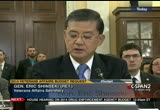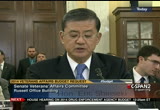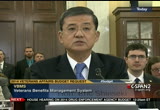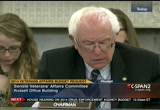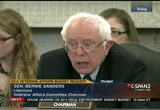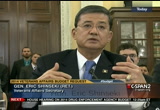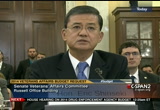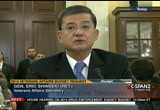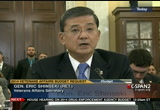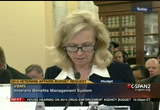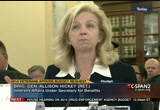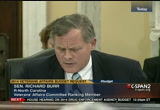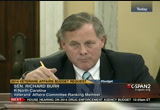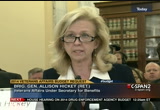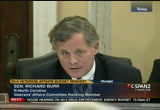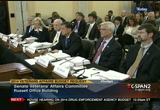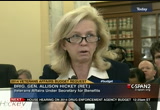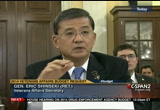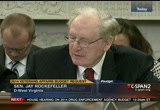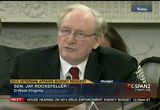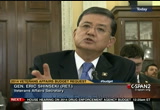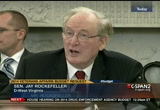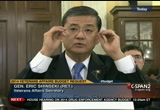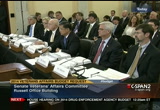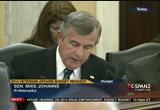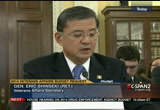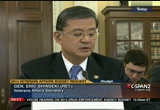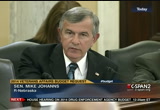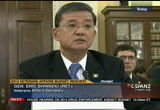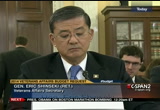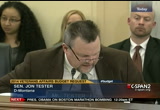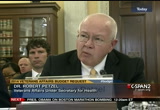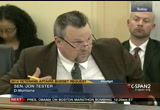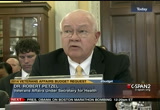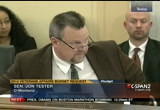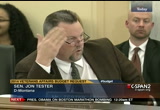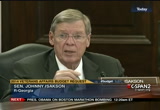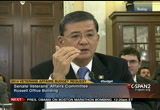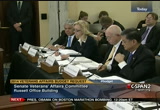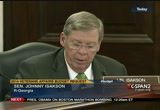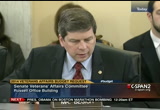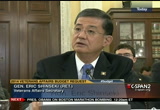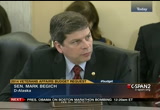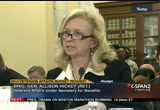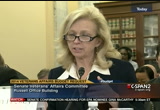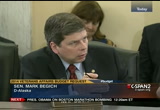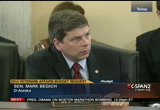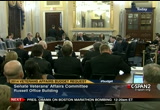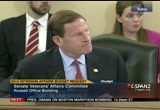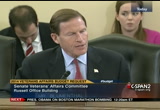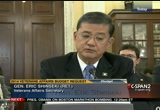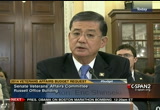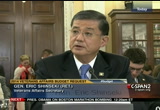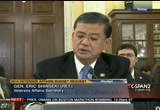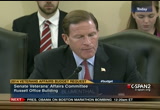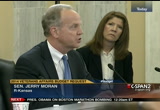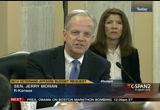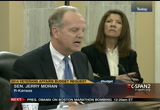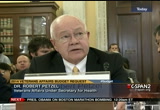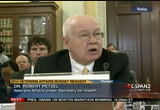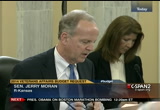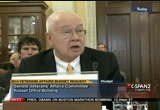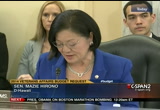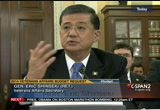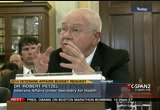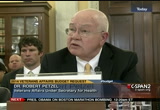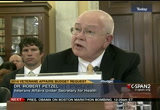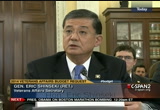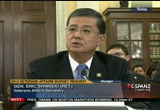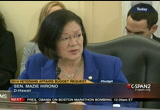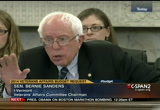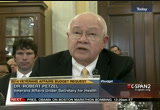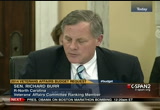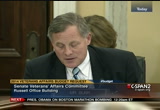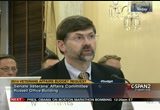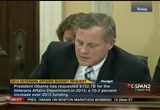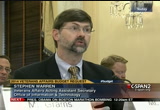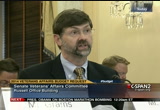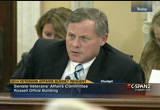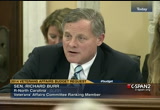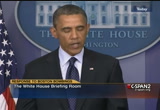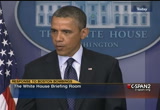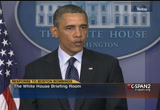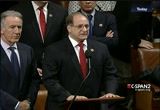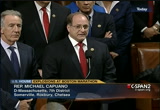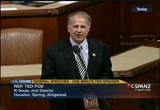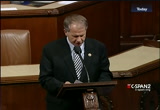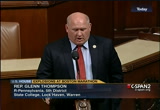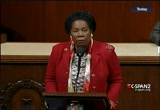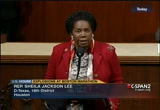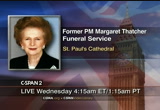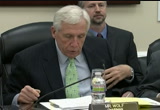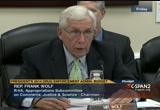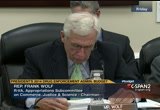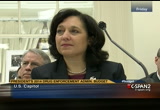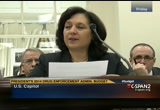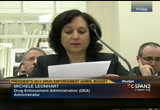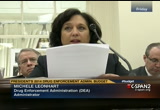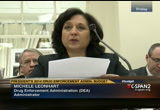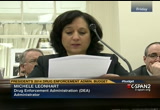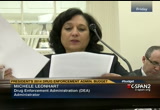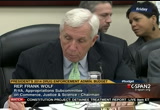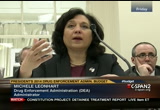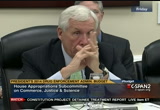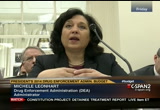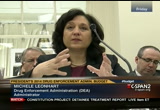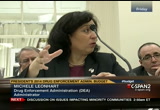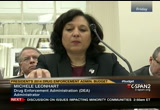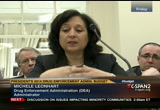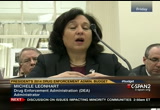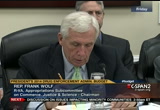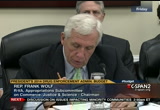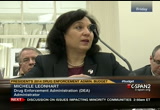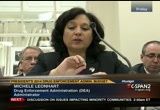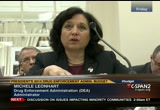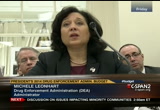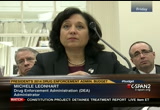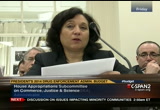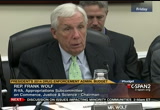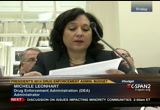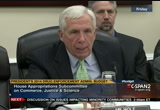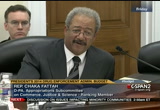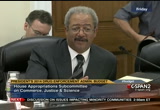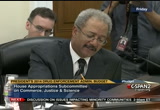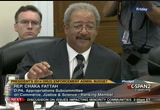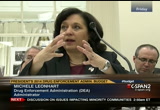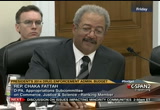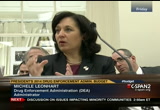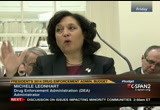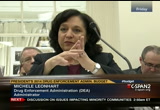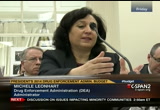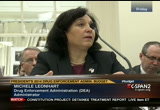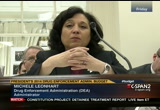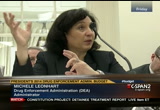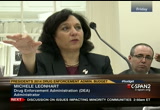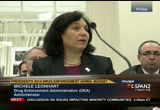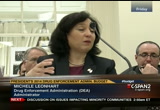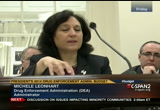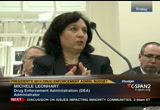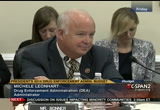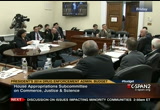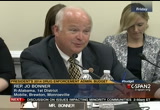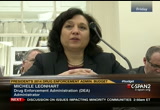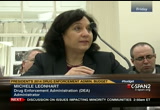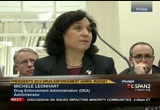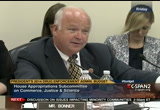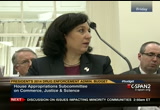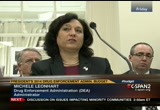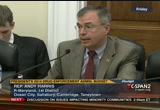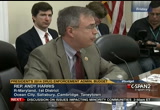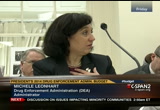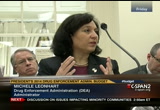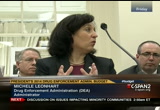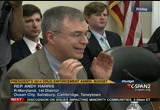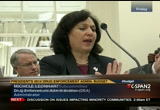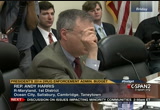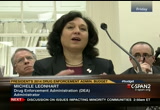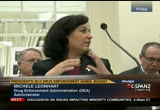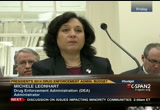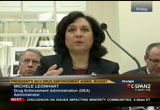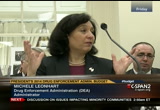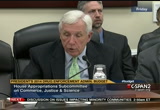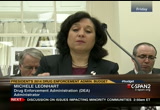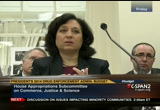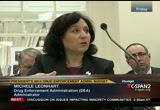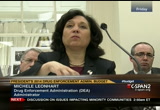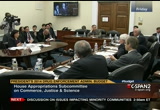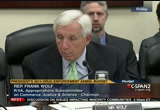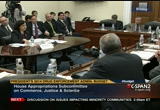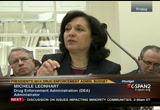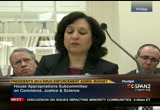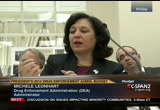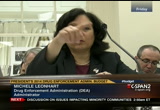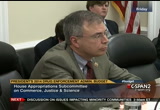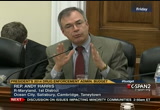tv Capital News Today CSPAN April 15, 2013 11:00pm-2:00am EDT
11:00 pm
no question. to many veterans wait too long to receive benefits they deserve we know this is unacceptable, and no one wants to turn the situation around more than this secretary, undersecretary, the folks who come to work every day 52 percent iphone are veterans themselves. we are resolved to limit the claims backlog. claims will be processed in less than 125 days unless and an 98 percent accuracy level. our efforts mandate investments in the people, processes, and technology, not just technology, people, processes, and technology. completed training to improve the quality and productivity of claims. more are being trained, and for the new employees at complete more claims per day in their predecessors.
11:01 pm
use of visibility benefits and questionnaires. online forms for submitting medical evidence has dropped average processing time as a medical exams and improved accuracy. there are now three lines for processing claims, an express line for those that will predictably take less time, a special operations lane for unusual cases or those requiring special handling, and a core lane with roughly 60 percent of the claims, and that is the remainder. technology is critical, and in the backlog. our paperless processing system, veterans benefits management system will be faster and improve access, live automation, and reduce aryans. thirty regional offices now use this. of 56 will have it by the end of this year. homelessness, the last of our three particles, to end veterans homelessness in 2015. since 2009 we have reduced the estimated number of homeless
11:02 pm
veterans by more than 17%. the latest available estimate from january 2012 is 62,600. there is more work to be done here, but we have mobilized the national program their reaches into communities all across this country. prevention of veterans homelessness is our follow-on main effort. the first phase to be completed by 2015 is the rescue of veterans currently on the street. at the same time, we are building a prevention program to keep others from ending it there. mr. chairman, we're committed to the responsible use of resources that congress provides. again, thank you for this opportunity to appear here today , and we look forward to your questions. >> thank you very much. thank you very much. let me begin by addressing an issue that is a serious one that
11:03 pm
i think every member here has spoken of and you have a knowledge and one that is of great concern to this country. now, my understanding is that the va is now processing more plans today than they ever have before. >> that's correct. >> significant numbers. my understanding is also that according to the most recent monday morning report, there were nearly 890,000 claims for entitlement to benefits pending, almost 70 percent of which have been pending longer than the department's goal of 125 days. and this number does not even take into account other pending work, including award adjustments and appeals. so here's my question. you have, and i believe you've established that call not long after you took your position. you brought forth a very, very ambitious goal, and he said that
11:04 pm
you wanted to process all claims in 125 days and with 98 percent accuracy by 2015. is that correct? all right. >> that's correct. >> let me ask you this. what benchmarks have you said and it must the va need to make sure that the va achieves those calls? another would to might think all of us would agree that the task that you have undertaken going from an unbelievable amount of paper, a system that was virtually all paper when you took office to a paperless system is a huge transformation. the concern here, and others have raised it, is what reason do we have to believe that you are, in fact, going to be able to successfully undertake that transformation and meet the goals ambitious goals that you have established. >> thank you for that question, mr. chairman. i'm going to call on secretary hickey to add some detail.
11:05 pm
let me just describe the situation that exists. we are in paper and have been for decades. a continued the paper today. if you are going to manage a situation it takes a certain kind of approach and resources. we thought that for the long term, the benefit that veterans and the backlog. and so we set the goal of ending the backlog in 2015. we did some rough calculations. and the backlog, when we arrived, was not defined as 125 days, 90 percent accuracy. if we want to make a bold move here and help veterans and we have to move quickly. and so we set ambitious goals. we did our best estimates, and we have laid out a plan in this budget that is resources that drive those numbers toward ending the backlog in 2015.
11:06 pm
i think all of you will remember , after we established that goal of ending the backlog we also took on some unfinished business. we had vietnam veterans, my first year here as i moved around who were not very happy with the fact they had not had their issues addressed. you know, in many cases i was told that we were just waiting for them to pass so that would not have to take care of it. i cannot think of a more demeaning circumstance for a veteran to feel that that is what they're va that exists for them looked upon the situation. and heard the same kinds of things from gulf war veterans, 20 years after the gulf war, no decisions regarding their health care issues. and then i think all of us can acknowledge, ptsd has been
11:07 pm
around as long as combat and has never been acknowledged as associated with combat. verifiable ptsd, so even as we established ourselves commending the backlog, we took on three pretty significant decisions. for the vietnam generation, three diseases for exposure. nine new diseases, never recognized before from gulf war veterans, and then all combat veterans of verifiable ptsd, access and service connection so that they could submit there claims. i would say that those numbers added to the pay for a process that we had. in fact, it was going to grow the inventory and complicate the backlog. and we testified to that when those decisions are made. the number of hearings on this. and my prediction was we are going to go up. the same time we're going to put in place and automation system
11:08 pm
that would correct all of that and come in time, we would bring the backlog back. we are mitt stride. we are now feeling that automation tool. it took us two years to develop it. it is called vms, veterans' benefits management system, and 30 of the 56 regional offices. we are seeing some indications that it is having good success command we intend to field the remaining offices as quickly as possible. we have some good learning that came out of automating the new 9/11 process and the learning indicated to us that there was a tremendous lift that comes once you have the systems fielded. we follow that model of fielding implementing an antiproton robust enough to handle large claims processing. as i say, we are scheduled to
11:09 pm
complete this year. we are pulling that as far to the left as we can and fielding as quickly as we can and doing it prudently where we don't run the risk of overreach. >> general, did you want to add anything? >> i would like to add to the discussion. the secretary has said -- and of that quiescence. wanted to give you a few bits and pieces of a milestone that we have experienced in the education plan process that is being built by the same people. we have tripled our productivity through the spring season as a result of the automated rules engines that went into long-term solutions a paperless itunes system fastball. we went from doing 79,000 claims per month to doing more than 285,000 claims amount to reducing the days it took to do those claims down to four and a half days on average where we are right now today in the body
11:10 pm
and the bulk of our 9/11 bill claims. we are applying the exact same strategy to the rules based capability going into the ems are quite literally the veterans will go online which exist today , filed the claim, like they do there taxes, apropos to say that today. it goes directly into the ems without advertising. we completed that whole peace this year in january, without advertising it we have 500 claims. and because directly in, never turns into paper and allows us to immediately start working and today we don't have 3 percent in paper anymore, we have 3 percent electronic. we have 14 percent of our paper already converted to electrons just this january the 28. i have more than 116,000 electronic claims now, electronic folders that we did
11:11 pm
not have before. this week will have another six regional offices on the new system. >> mr. secretary, the va backlog reduction plan shows that in order to eliminate the backlog by 2015 the va will need to decide over 1 million claims this year. but the va is projecting in the budget submission that it will decide 335,000 fewer claims in 2013 and 2014. so can the va reached 2 million claims in 2015? that would be an 92% increase in productivity over the 2012 level .
11:12 pm
>> i am sorry. i don't exactly know your numbers, but i'm happy to take them and go look at them and come back. >> i'm pulling them right out of the budget reduction plan which was submitted in january. january 205th. and the math would work out to eliminate the backlog by 2015. any to the side of 1 million claims this year and almost 2 million in 2015. now, in the projections under the budget submission, that says that over the next two years you'll decide 335,000 less claims them what the budget -- what the backlog reduction plans i am trying to figure out if 2015 -- if you are certain on that, that means you have to
11:13 pm
process over 2 million claims in 2015. is that how your math books at the? >> i would love to come sit down and talk to you. those numbers are different than the numbers we sent across and that all of open questions to your staff on. i am happy to do that with you. >> in the budget submission you do say that you will decide the and and 35,000 fewer claims. >> senator, the budget submission is that a different. we have seen a significant drop. we have seen a drop. >> currently nearly 7 percent of the clans are backlog meeting may have been waiting for decisions for more than 125
11:14 pm
days. the strategic plan use a bit less than three months ago rejected the backlog would be reduced to 68% in 2013 and 57% in 2014. they now expect more than 40 percent of the claims to be back law during either of these two years. so in revising these projections what matters did you look at and what did they -- what additional you? >> i looked at the actual submissions of receipts of claims that we have received from our veterans of the last five months. each month they have been lowered and are expected volume. >> the math works out to where you would have only a 40% backlog situation. >> no, it doesn't. i don't think that you all would throw me out of here if i said that that would happen. is now where we are. we are at about 69 percent of
11:15 pm
our plans right now that our older than 125 days, working every single day to drive that never south. we're doing it to focus on how people process technology solutions. as far as we can pushing a productivity by folks from i can tell you today that 70 percent more effective and higher productivity than they were prior to us moving into this transformation plan. >> last year he testified that during 2013 the backlog would be reduced from 60% to 40%, and that would -- and ' -- demonstrate that we are on the right path. at the time did you envision that the backlog would stay above 65% for the first half of the fiscal year? or that it would be 70% in april? >> senator, we do have a pg guidance. our annual planning guidance that we communicate with to our
11:16 pm
federal government partners. and they are usually aspirational in nature. on we see a change or a difference, as the secretary has pointed out in terms of the work of the recent increase, the increased claims associated with ptsd in the like, we did know that we would probably not be able to meet that 40 percent guidance, but the fog was you leave your stretched allowed to keep trying to work hard to get to it. >> a simple question. is the strategic plan that you sent to congress aspirational? >> senator, i grew up as a strategic planner in the military for quite a while and now that every strategic plan i built over the years with the united states air force always was a plan. plans are always in contrast. a change. and so we have and will continue to improve upon a plan.
11:17 pm
>> was it developed to be aspirational or was it developed to give us an accurate blueprint of help va perceives? >> i think in all planning there is an aspect of aspiration at the beginning and then it is with assumptions and the availability of resources, it is adjusted for what we think is achievable. a long-term plan, like this one, with as much dynamics involved, we make an assumption, for example, that the flow of veterans out of uniform to the va is going to follow a pattern that we have been provided by the department of defense. if that changes that adjustment then we will have to look and see whether we can accommodate
11:18 pm
the change. if not we will have to say we have to resource. >> thank you very much. i look forward to sitting down with you to look at the matrix that brought about such a change in release three months. let me just say, i really wasn't addressing the increased number of claims that come in the door. i was addressing the number of claims that are actually processed and determined. that does not seem to be getting better. i think the chair. >> thank you. senator. >> thank you, mr. chairman. i am going to try and nasty to questions. it is homelessness on the one hand, suicides on the other. how did you pick the tragedy, the worst tragedy?
11:19 pm
up to 22 suicides per day. so let me just concentrate on that for a second. you are making an enormous move in mental health. you're bringing in not only the mental health experts but also the support staff that they need to have. it will take time to get them into the system and trained. but how do you look at the general population starting with ptsd and then obviously as it gets into mental health, clarify themselves and raise red flags. how do you take somebody who is on a suicide watch list for something of the sort, how do you go to work with that person? how do you try to break through the back. >> senator coming it is -- the issue here is no one should have to wait for mental-health care. we have resources.
11:20 pm
our veterans health administration, nearly 57%, an increase from 2009 to the budget. we believe this is where we have to the put our emphasis. regarding the suicide number that you cited, you know, four years ago we were not receiving suicide information, a veteran suicide intimation from the state. we wrote. the states have been very responsive. now we have that information flowing into the cdc of which we have this latest number, 22. four years ago we get an estimate. the best way that we could from mental health experts. they pegged the number of about 18. so while this looks like a growth in the last four years, it's really a better number based on data we perceive. a fair call, but we have better
11:21 pm
information with 22, and we can set about doing things that we could only speculate at four years ago. so increase in the mental health budget that allows us now to do things like increase staffing where we find that we need additional resources. provide an update of where we are with regard to hiring additional mental health and i will come back and close out. >> before he does that can i ask my second question. and it is, suppose. i remember a number of years ago, the excitement generally when it was department of defense and the veterans administration planning to work together, i went through a number of facilities. everything was will of optimism. now all the sudden evidently, unless i'm wrong, there has been a pullback from that.
11:22 pm
electronic records, all kinds of benefits flow from this corporation. there has been a pullback from that by department of defense. i'm curious about that. >> we are both still permitted to a seamless transition of service members in tech va. that has not changed. we are both also committed to electronic health record that we share in common. in the language that we have come to use of the past four years of growing the concept, it is a single joint common integrated electronic of record, open to architecture, not the criterion designed and and all of those terms are code to keep us focused on what we want in an electronic of record, one that we share together and one that will be as good five years from
11:23 pm
now as it is on the day we first invest in purchases. as opposed to being phased over and over again with an aging electronic of record, we somehow have to refinance years down the road. so this is the concept that we have committed ourselves to. and i would say my sense is we have not backed away from that, although the secretary who has just arrived is in the midst of getting into this issue. i have agreed that he ought to have time. >> if you don't know of any. >> i am not aware of any. >> happy to hear that. >> and i apologize for doing that to you, asking two questions. my time has run out. i have to play by the rules. >> senator. >> thank you, mr. chairman.
11:24 pm
mr. secretary, in the budget request i note that there is funding for just one across the entire country, major medical facility. that is about $150 million for mental health facilities in seattle. not questioning in all weather that is needed and not. among the minor construction request is for $715 million, substantially more. that is an increase of 17% from the 2013 level. the va have an estimate of the amount of minor construction funding that is needed to keep aging facilities patched together until they finally make their way up the prairie realist
11:25 pm
which if there only doing one a year, that will be of long, long way. how much of that money than is actually going into trying to keep aging facilities operating. is it all that money? >> senator, let me answer the broad question of construction budget. it includes over 2 billion for major and minor construction, which you have last about. non-recurring made mince, which has a lot to do with facility conditions, and major medical. minor construction, as you indicated, as increased by 17 percent compared to 2013. this is important to us because this is money it gets into the hands of hospital directors very quickly and in packs more facilities for the kinds of things you are concerned about and services directly to veterans. major medical, a request is an
11:26 pm
increase of 12% compared increase of fall percent compared to 2013. and here they're intended to provide health care delivery closer to the what veterans want which is all this business of, of community-based outpatient the mix and so forth. major construction, the request is for $342 million. and as you indicated, there is one major project here. but it is a stable program, and we have a plan for in face funding for the execution of a number of large projects. non-recurring maintenance, $709 billion, again, remains stable in comparison to 2013. and here we're dealing with this safety facility condition of deficiencies and other high
11:27 pm
priority needs to make sure that the facilities that we do have a safe, secure, and accessible to veterans. this is a balance across our programs, and i would just offered it is a stable overall program with emphasis on minor major leases are medical leases and assuring that the nonrecurring gains is maintained in a stable way. >> you can see where i'm headed. my concern is that you have a whole host of old buildings out there. certainly they would not be what you would want if you were going to build a facility today, obviously, because there probably 50, 60, 70 years old. i am worried that we are putting money into these zero facilities to me it seems almost like a
11:28 pm
waste. is there -- has the va studied any possibility of trying to jump-start this program? to try to get more new construction verses putting money into old buildings. are we just stuck were reroute? >> i don't -- i don't describe us as being start. i mean, you know, there is another dollar to be had. there is a place i could put it in construction. as i say, it is a stable approach to a large footprint. part of our responsibility is to decide what part of that footprint we no longer need. in the last several years we have reduced the amount of vacant space and consolidated and reduced the amount of underutilized space in both categories some 25 or 26%.
11:29 pm
so we do that as well. there are other pieces of our property that we can dispose of and do the through the demolition and look for other means to find other uses for what we no longer need. we used to have an enhanced use lease authorization that expired in december of 2011. and our efforts to have that authorization renewed and extended have succeeded in providing for an enhanced use lease arrangement for homeless requirements only, so we do have that. and right now we have a number of projects where we have created homeless housing for veterans. about 5500 units. so we do manage those older
11:30 pm
pieces of property. we have need for some of it, not all of it, and we need a way to efficiently dispose of it. >> thank you, mr. chairman. >> i think you, mr. chairman. more questions than we have time, but we will start with the caregivers bill of 2010. that bill provision established veterans coordination pilot so that a lie f and know we have veterans could get care from community-based providers for mental health in cases where the c-span2 did not have capacity. the provision give them clear authority to contract out mental health services for 0is and lef veterans in rural areas where mental health providers are a premium. can you give me any progress on this? unless i say that is because montana has for community mental health centers in montana serve in the west, the south, the
11:31 pm
central command the east. the north as well. none of those are contacted. just wonder where we are as far as progress. >> thank you, senator. the event of the bill has really been overtaken by the executive order from the president. we are in the process now of developing 15 contract pilots across the country with the community-based, requalify community-based clinics to pilot the concepts of the contract. if this is successful, and we are quite confident it is going to be, we will be doing this across the country. i was not aware -- and let me. i was not aware of the fact that the montana clinics were not contacted. >> correct me if i'm wrong, but do not believe that they are.
11:32 pm
they're not contract it. >> the question is, okay. fifteen pilots committee executive order. enhanced 2010. where are they? on the up and running? if not, when will they be? >> virtually all of them are delivering care. a number of them are doing it by contract. some others had difficulties getting the contracts executed immediately, and so they're doing it on the basis. contracts are in process, and we expected within a month to everyone will be operating. >> come with you anticipate an assessment of their effectiveness? >> i would hope that we could do that led summer. >> super. >> we have issues that go along with the partnerships.
11:33 pm
we have partnerships to folks at moments of confessionals and health care professionals. we have had conversations off the grid with you on that. what kind of strategies does the va used to retain current mental health workforce, particularly in rural areas and if applies to regular health care folks because you addressed in both. >> thank you, senator. that va has really a very flexible possibilities when it comes to hiring and retaining people. first of all, for clinical psychologists, psychiatric social workers, mental practitioners and mental out that psychiatrists with great flexibility in terms of salary command salaries are competitive, almost anywhere around the country. >> who has the flexibility? is that locally with the state or with the visit. >> of flexibility lies with the
11:34 pm
individual facilities. >> okay. >> there are certain circumstances where there would have to comment, but it is unusual, and they have granges as salaries that they can work with. >> you need other tools for recruitment? >> i think that the -- the thing that limits as a little bit is the fact that our debt forgiveness stops and $60,000, particularly for medical students and residents. that may be a drop in the bucket , so the speak. i would like to see if we can raise the limit on which we can forgive debt. >> i would love to have a recommendation to see have the business. and i have any idea what a nurse practitioner with mental help acrobat come out of college with . i would love to get some recommendations on where that $60,000 cash pot to be.
11:35 pm
>> i would like to put the finest point on that statement. >> i got you. sixty grand is a lot of dough, but some of these folks may be coming of college with 200 grand in debt. i don't know where it's at. it would be good. it's not all on your shoulders. the last thing that i have -- really quickly, will play by the rules. what kind of impact does this have? talking a lot of flexibility on salary, kind of factors that have on existing staff. i don't want to be the devil's advocate. someone on staff. you offer 100,000, what kind of impact does that have gone around? something you are cognizant of in some ways you can address existing staff that a doing a helluva good job.
11:36 pm
>> yes and yes. we are cognizant of the fact a particularly with psychiatrists that can be a problem and have ways that we can address that. >> super. thank you very much. >> thank you. >> thank you. i want to the follow up just a second on leases. in the president's budget in the construction account, the relocation. it is an old facility. some 900 square feet. in your facility in the northeastern part of that area. that is a huge area that serves a lot of veterans. they're now forced many times to get the veterans hospital in decatur, georgia, which puts more pressure on the facility. i want to say thank you because i know your request had to have something to do with that, and held that is a 2-for-1. i think it is a lot more efficient on cost than anything else we could do.
11:37 pm
thank you very much. secondly i noticed you had no washington moment last week with the washington examiner got all of one of your e-mails. i was reading it. first of all, having had my e-mails got into the four, and know how it feels when someone does that. comment on an e-mail you sent to someone talking about a bunch of big brains to deal with the problem of timing in terms of claims approval. and it was dated march the 30th, which is a couple of weeks after are hearing that we had here and plans were you indicated we were kind of contract and claims and in this e-mail goes out looking for the best brains can get to come in and help when you have a crisis. can you kind of clarify that? >> thank you, senator. >> can i just dark. >> you're the boss. >> i was saying, from the perspective of innovation this has been something we have been doing for three years to my going out and getting the best
11:38 pm
minds to come in and help us. inside va, outside va, just casting a broad that it be the first year we got 40 initiatives, which we had taken a board and not all of them work, but we investigated all of them. the next year we did the same thing. this fits in our always looking for a better way to do what we're doing, to address the needs of veterans committed it to them as fast as we can. at think the secretary was part of that. i would say in 2015 when we hit the target we have set for ourselves, there will still be looking for good ideas. with that. >> senator, secretary stated very well. we keep doing process improvement. now part of the culture and the governance. we actually have people whose job it is to do process improvement. this is nothing more than let's
11:39 pm
keep thinking about this and getting more and more ideas on the table but keep charging hard with the plan we believe is going to get us there. we are not even just looking at compensation claims but our whole. i have six other business lines. how can we do more and more better to increasingly serve our veterans. it was a course of action to keep going and probably tell every other team out, we have an urgency the matter what we're doing right now to just two are really much better job by our veterans are family members. >> my hope was that what you said was what i hope the answer was to the question. i do oppose this to you. and i am speaking for myself. the ranking member may disagree. we don't necessarily fall in the big brain category. it might be helpful to us to call out to us to come down to see what your problems are, look at them firsthand.
11:40 pm
sometimes we will ask questions about why something is taking so long to do or something is not happening. you give us the very best answer and sure that you can't. the next meeting comes up and we have the same panel. it just occurred to me that it would be great to win by as down and say this is where we're having trouble. if you have any ideas because always being the critics in the peanut gallery, we get down on the ground floor and see what those things really are. i think the average is important and ought to be inclusive. that was my reason. >> thanks. a great offer on your part, and we're happy to take you up. >> one last thing, just a question for me. the veterans benefit management system request is for 155 million. is that right? >> that is correct.
11:41 pm
>> 302 million is for development assistance. there was the other hundred and 22 million going to be used for? >> thank you for that question. the balances to pay for sustainment costs that we have been bringing on line for the past two years. you have to pay the bills to pay a licensing on it as well as the operation's costs to continue the program. >> use a licensing. i guess you're talking -- >> the software license, barbara maintenance and the system in its. >> and that is an ongoing cost. >> estimates it is. >> that is what i just want to be sure. thank you. >> thank you, senator. >> thank you very much. again, secretary thank you very much for being here. let me, if i can, first start. i know you said it in your
11:42 pm
prepared comments and so forth above let me if i could restated. in regards to the disability claim, restate your goal and when you think you will have as much as you feel comfortable to have under control in the sense of the backlog? give me your -- i know you have a target. can you restate that for me and then kind of what your confidence level is. >> it is a tricky question. >> well, i would like to provide a more specific answer to you, senator, but, again, this is based upon our experience with the 9/11 gi bill. we started building in 2009. by the spring of 2010 we had version one, and we have been building on it ever since. the secretary described the lift
11:43 pm
when it all boylston street. we are still in the process of fielding of the ems. we started september. we're barely six months and. we're looking at a fielding much earlier than december of this year, which is the plan. i think once we are fielded to lawfully fielded, we're going to begin to see a production impact we will also tie with dod providing as electrons beginning in january 2014. >> if i can interrupt you. how much faith you have that department of defense will actually perform what you need to do? i know that has been a struggle in the past. do you believe they will meet the goals the you have for the information flow?
11:44 pm
>> they have committed today and time specific. we have the date and time here. >> they are committed to give me immediately point forward. >> to all, they will complete. >> they will first give it to me in paper, which i would rather not have. they're committed to building a system. they are giving me something we have never had before, which is, they're going through and finding their medical records, going and reaching out and pulling those medical records and pulling in their contract medical records and doing the business on their in the polling all that together, certifying it is wonder% complete in handing me it fully complete medical record. >> complete written record. will they go to electronic. >> december of this year.
11:45 pm
>> this year. >> and that is cases from that date forward. and then you have the backlog to bewitches the longer challenge. am i reading that right? okay. now they are doing all the combining of the work. the guard and other folks. that will come to you immediately. december electronic efforts of anyone will now be coming to you electronically. and then they will commit to of those those others in which way? how will all of the backlog information -- >> essentially the backlog information i am handling. >> is all piled. >> you are the target. >> getting that move into full implementation. >> i am doing it right now be 116,000 already in electronic. right now today. i am also committed to any new plan that comes in the door that immediately turns around.
11:46 pm
they're doing a very good job. turned into an electronic claim and worked through electronically. i am also, if you are a veteran who is not one to come back to us, then i won't expand the resources. >> try to do two more quick things. first off, i know you have your patient centered care program, $257 million for that investment which we think is great. part of your implementation of your patients aligned care teams. i know your teams went up to alaska, looked at a system that we have which is very similar to what that will do. can you tell me the connection. if there are resources in there to try to utilize the mall, and on and who would like to answer that. >> thank you, mr. secretary. we are very much enamored of the bottle. it is similar to what we want to
11:47 pm
do in terms of patient centered care, pro-active, personalized health care. but it is doing some things that we, frankly, had not thought about. we sent four teams appear so far for educational experience. we plan on continuing that effort. i will be meeting with kathleen gottfried, the ceo. >> see a value. >> absolutely. >> last question. $52 million in your budget. within your health services for some of the new programs. reservations as well as we can. the alaska overall component. is that enough or do you have a sense on at this point? a want to thank you for reaching out. trying to do something very different with health care systems that exist already. is that enough reimbursement? hard to say? give me a sense. >> i think at this moment we are just getting, standing of the
11:48 pm
agreements and beginning to activate them. i think that is a good starting point. let me ask the doctor. >> no more details. i would agree with the secretary that we think this is enough. ten pilots are being developed to get the business rules fixed for this environment, and we think that this will be sufficient in 14. >> other questions for the record. that last question was something that i know you and i have talked about, how to maximize delivery to the veterans in tough locations, rural locations we will see one coming in a thank you for that effort. >> thank you, mr. chairman. i apologize for being late. i have been following some of the testimony. want to thank your for your service. mr. secretary, particularly for your active duty service to our nation. now in the department of
11:49 pm
veterans affairs, and to the president for increasing the resources available to our veterans in a very difficult time fiscally. let me begin with the senators area of inquiry relating to the electronic of record. i had understood that you described what was going to happen, but i am not sure that i heard what the target date was. >> we're talking about clam's year, completing the claims. >> the electronic record. >> the electronic health record complete certified. >> let me talk.
11:50 pm
the electronic health record system is still going forward. >> as far as the viejo is concerned we are committed to it and which department of defense signaling to us that we have agreement here. i believe we are on track. secretary has asked for the opportunity to review the structure and process. >> you have no assurance right now from the department of defense? >> i don't have one. we're both working. >> agreed to go forward. no other details. >> for va it is choosing vista
11:51 pm
as our core, committing to a 2014 initial operating capability, integrating two locations. full operating capability. both departments. >> both departments have agreed to that plan. looking, reviewing with the decision on the core is going to be. we have selected vista and offered it for their consideration. the secretary has acquisition folks at the department of defence to review. >> forgive me for my revealing my limited i t knowledge, but
11:52 pm
how would the system work if you are committed to vista and there not? in other words, if they go to a different system? >> well, we today have two different electronic records, health records. well we have committed to is solving that problem, that challenge by coming out with a single joint common integrated electronic of record. all of those terms began on the same sheet of music. >> i apologize again for belaboring the point that may be obvious to everyone else in the room but it strikes me from what you're saying that the details had not yet been resolved. is that fair to say? >> we await a decision by department of defense on their selection. we have offered consideration of this government on been operated . anyone else can use the code
11:53 pm
that goes with. and won't have to pay for it. >> thank you. you know, unemployment, shifting subjects, unemployment among veterans is one of my major and paramount concerns. i wonder if you could tell us about new initiatives that you are contemplating to address unemployment among veterans. >> well, senator, we have taken the communal, the lead of the white house, joining forces has been a magnificent initiative, reaching out to the private sector for corporations to commit to hiring veterans as a part of their campaign to help us reduce the unemployment numbers for veterans, especially
11:54 pm
our young is the veterans. the request of the private sector, 100,000 new jobs for veterans, military spouses before the end of 2013. succeeded in late 2012, understand. more commitments now to increase something in the neighborhood of 250,000. the commitment is there. i would say that across government we hire veterans. we have hired -- we have over 100,000 veterans as part of our work force, 30 percent. our goal is 40%. we have also held hiring fares for veterans interested in employment. we have filled three of them. it is not something that we have expertise in, but we have learned with each of these help to bring together veterans
11:55 pm
looking for work and employers with jobs. we also encourage veterans who own small businesses to stand up. our experiences, more willing to hire veterans. so the more successful small business owners we have this is where the hiring really goes on, the more he have the job market. >> are there additional resources in your budget? >> we have resources to at least our hiring fares. and as part of our hiring campaign for veterans we continue to increase that within our allocation in the budget. >> thank you. and if i could get from you at some point -- dawn of a you have them here today, the latest numbers on unemployment among veterans in different age groups and so forth and many of the
11:56 pm
demographics that you have. >> we can do that. the numbers are generally improving. we have month-to-month variations, but over time the unemployment rate for veterans of world has been below the national average for unemployment. for your veterans this is still a challenge for us, and we have to do more, all of us have to do more to take this on. >> thank you. thank you will call the members of the panel for your service to our country and thank you for your testimony. >> senator. >> mr. chairman, thank you. to follow what to what the senator was talking about conchos for veterans, one of the aspects that we focused on is entrepreneurship and startup businesses. this committee on thursday will have a roundtable discussion in regard to the va, veterans opportunities to support a entrepreneurship and startup
11:57 pm
businesses. a method of earning a living in providing for families. i appreciate that is occurring. thank you very much. mr. secretary, when we last visited which i think was in january, i, as usual, highlighted a shortage of professional health care providers within the va system, especially at least what i am most familiar with the kansas. we talked about our see box. kansas is a very rural state, long distances to travel to the va hospital. successful with the va help in opening see box, but a tremendous shortage of positions , nurse practitioners, and physician assistants. most of our see box no longer have a position. my understanding is that has not changed since we visited in january. i want to highlight the problem once again. else or raise the topic of mental health professionals.
11:58 pm
the plan is to hire 1600 new clinical mental health staff, including marriage and family therapist at licensed professional counselors. my understanding is that -- may be you include this in your testimony, but a significant number of that 1600, little over 1,000 have been hired. the numbers in kansas are surprising or discouraging to me . kansas, again, because of our rural nature, that is not end untypical, not in a typical way of providing mental health services to my the utilizing in ft your help pc. and from august of 2011 to august of 2012 there were no mf ts and noel pcs hired at any kansas facility. u.s.a. jobs, viejo has posted zero positions in kansas for any one of those professionals.
11:59 pm
12:00 am
i will go back and find out and get back to youment. and hiring this people in rural areas is a very good idea. so i will be in communication about kansas specifically and what we might be able to do. >> i appreciate that and look forward to your response. it reminds me of the efforts that i was -- legislation in the house to incorporate chiropractic care within the va. can you bring me up to date on the chiropractors? >> if i do. >> we employ them at every medical center with a substantial amount of referral business. >> it remains a priority for me, the rural nature of kansas, chiropractic care is a significant we that healthcare
12:01 am
services are delivered, and it may be the same pattern. the va, in my view, is very slows -- before any of your time -- very slow in incorporating the mandate that the va provide for chiropractic care in the va system. and let me races one more topic. i asked this question again last january. i've not received a reply, and it is apparently not in the fy 14 budget. there has been considerable planning for a joint va/dod medical facility at mcconnell air force base, and not in the budget, and i asked for a status update last january about mcconnell and the wichita -- dole va in wichita, and if you have information today i'd be pleased to know what, if any,
12:02 am
progress is being made. >> thank you, senator. in is a proposal that's been developed for a major construction project that would be a joint venture with, as you point out, mcconnell medical snemplet $154 million. it was submitted in the mix of those projects that were rated. in the skip process, which rates construction projects. it did not score high enough to be funded in 2014. >> that scoring take place in the va or in the administration. >> the score its done by the department of veterans affairs. >> what does that mean for the future of this project? >> well, the expectation would be that this project will be submitted again, and will be scored again. >> i'd like to follow up with you and find out the need for greater information or any
12:03 am
deficiencies that we ought to be addressing in regard to this project. >> what usually happens on the strategic capital investment plan, this rank ordering, the prioritizing, the ones that are funded get worked off and then there's a review, and then others move up in subsequent cycles. >> we'd like to work with you to see it's moved up as quickly as possible. thank you, mr. secretary. >> thank you. >> thank you, mr. chairman, and this is -- i join my colleagues in thanking you and the rest of the panel for your service. i do apologize for being -- for missing some of the hearing, but i did have a chance to talk with you earlier, general shinseki, so i appreciate that. i want to focus on women's health. you noted 58% facility of va
12:04 am
facilities have comprehensive women clinics, and you asked for more money, for an increase in the budget for gender-specific medical care for women veterans. so is it your intention and goal that 100% of our facilities will have these kinds of comprehensive care for our women veterans? >> i'm going to call on dr. petzel for the specifics, but, senator, would just say, today i believe women or maybe 6% of our veterans enrolled population, and we know in the act, they represent 15% of the population of the active force and the reserve components, maybe 17%. so we know there's greg -- growth going to occur and we're doing everything we can to put in place the decisions that, when they rave, we aren't playing catchup as has been the
12:05 am
previous experience of mine. so, we would to look at women's -- women veteran funding since 2009, between 2009 and 2014, we have increased that by 134%. and we will continue to put emphasis on this is a one of our key areas. dr. petzel. >> thank you, mr. secretary. senator, the specific question you asked about women's comprehensive clinics, there are three ways we try to provide the primary basic care that women veterans might need in our large medical centers where we have large numbers of women, we have comprehensive clinics that bring together not only primary carry providers but obstetricses, gynecologist, mental health, endocrinologist, install the same clinic area. it places that -- in places that are smaller where we may not
12:06 am
have all of that special expect tee we have primary care clinics devoted towoman's issues issuesd women veterans. those practitioners are trained to recognize and take care of the primary carry needs of women veterans, and then in a very small area is where we might have only one or two providers. we train those primary care providers in the needs of women. i think there will be some increase in the number of comprehensive clinics, but i think most of the medical centers that have a large enough population to do that probably have already done that. i do want to point out that we have an obligation here to provide the kind of an atmosphere where women feel safe and feel as if the providers understand their specific needs, which are different than our male patients, and i think the va has worked hard over the last ten years to try to accomplish that. we still have work to do. >> thank you.
12:07 am
i think that that's really important, and i commend you for the steps your taking to recognize this is a different population of veterans, and perhaps -- do you do outreach to make sure they're aware of the services and the kind of services that are available to women veterans? >> yes, we do. we have, under the direction of dr. patricia hays, who runs the program, we have an extensive outreach program, including happenlines, public service announcements and advertisements. first of all, trying to make women understand they're veterans in many instances they don't necessarily view themselves as being veterans, and then on top of that they don't necessarily see the va as a friendly place for them to get health care. so we work hard to bring that message to them. >> thank you. secretary shinseki, i know one of your major priorities is to address the needs of the
12:08 am
homeless veterans, and that is a challenge. so are there particular programs or things that you're doing that work with this population? i realize that it's not a monolithic group of folks, but any particular successes of -- program successes that can be ramped up? >> we committed to ending the rescue phase of veterans homelessness in 2015, and that means when you hear the word homeless, you think of people on the street. that is a visible -- it's an estimate but that's a visible population. there's larger invisible population of homeless veterans at risk. one paycheck, one more missed utility payment away from being in foreclosure. so this is -- while we are committed to ending the rescue phase, which is get out and find
12:09 am
our veterans and ensure that we are moving them to treatment, and safe housing, and to do that, we have partnered with many of the experts in communities across the country, provided funding for supportive services to veteran families. shelter. grant per diem support. at the same time we're doing yeoman work on the prevention piece. g.i. bill is the most generous education program we have. any youngster who does not complete schooling is at risk. last year we have 70,000 veterans who had defaulted on their home loans. and at recollection of foreclosure. -- at risk of foreclosure. our analysts became involved, worked with them to lower payments, extend their payment periods with financial
12:10 am
institutions. those 70,000 were kept in their homes, and precluded from foreclosure. part of the homeless issue is mental health, and substance abuse, and our veterans health administration, very large and aggressive programs that deal with depression, substance abuse, and other issues of mental health. we want to get veteran in early and get them into treatment. our experience is when we diagnosis and treat, people generally get better, and that's -- this is a broad effort. >> that makes a lot of sense. perhaps you can give us some data on how these prevention programs are working and the number of people you talk to or work with. and what the outcomes are. >> dr. petzel? >> thank you. you can send me the information or send the committee the information. thank you. >> we have gone through the
12:11 am
first round. i would like to ask a few more questions if we can keep it brief. i wanted to pick up on the question that senator moran asked. concerning chiropractic care. i'm concerned more generally about complimentary medicine, and i think people would be surprised to know that the va has been a leader in that area, in this country, and recently i was at the va facility in brooklyn the va facility in los angeles, and the directors there told me in both facilities, complimentary medicine is widely used and appreciated by veterans. i want to work with you to expand those concepts, to be more aggressive. i think you have a lot of folks out there concerned about overmedication. the ways we can deal with pain,
12:12 am
without a lot of drugs, et cetera. can you tell us, dr. petzel briefly, what ideas you have how we can expand our complimentary medicine? i'm talking about aku puncture, meditation, chiropractic care, yoga, et cetera. >> thank you, mr. chairman. just wanted to point out that 89% of our facilities. 125 of them, actively have cam program -- >> that may be true but if member is a well-trained and qualified acupuncturist as opposed to being an md who practices aku punk their, that aku punk 'erist could not be hired under that definition. is that correct? >> i have to find out, mr. chairman. i'm not aware -- >> thats my understanding. >> the places i'm familiar that
12:13 am
do aku puncture happen to have niecologyists who do aku puncture. we do yoga, hypnosis, acupuncture, animal assistance therapy, and medication. >> i'm aware of that and you should be very proud of that. my question is that while you, sitting here, support those initiatives, there's also an argument that it hasn't quite filtered down with as much excitement and precious -- and appreciation as it might. is that fair? >> i think that's a fair statement. one of the crucial parts in helping that to filter down is something we're engaged in, and that's research to demonstrate the efficacy in specific circumstances of certain alternate medicine therapy.
12:14 am
meditation other be an exam. we're looking at meditation and its role in treating ptsd. three pilot projects and four research projects to look at the three different kinds of meditation and how they work, and i think we need to do, quite frankly, more of that to demonstrate to the treating public -- to the treating physicians that these things effective and do work. >> i believe you're also looking at guided imagery. >> that's also correct. >> senator. >> mr. secretary, you said earlier we will proceed -- we will go out of the rescue phase on homelessness. would that be the reason that there's a reduction between '014 and '0'15" budget, drop of
12:15 am
1.8 billion to 157 million. >> i believe that adjustment is based on the fact that we think we will be making good progress towards our 15 targets, and so the adjustment is in the level of energy here. >> okay. a letter from the va dated february 2012 included the time iline of va homelessness strategy, including decisions regarding increasing or decreasing budget requests, allocating funding and decision whether to extend the timeline. have any of those decisions been made to date? >> to extend the timeline? >> increasing or decreasing budget requests, re-allocating funning and a decision as to whether to extend the timeline. >> i'm sure there may have been some discussions, but i have not participated in extending the
12:16 am
timeline. 2015 remains our target. >> okay. mr. warren, according to the fy '014 allocation sheet, va allocated for the electronic medical records system in addition the office of information technology's budget requested 252 million for the development, modernization and enhancement of the iehr and the vlr. does the 344 million include the 252 for the development of iehr and vlr or is the 252 million additional funding for those two? >> thank you for the question, senator bur. the 344 includes the 250 for development. >> 252, sir. okay. the project management accountability system, pmas,
12:17 am
creates and month mores milestones for projects. how many milestones have ieh and vlr missed? >> let me take that for the record instead of flipping through the spreadsheet which was delivered to your staff today. i we'll get back to you. >> i appreciate that. in are warren, carding to the fy 014 information sheet, the department of veteran affairs al low cake it 155 million for implement canes of the benefit management system. getting to a question was talked about and the president's request includes roughly 33 million for the development of bbs, $71 million decrease, and i think you answered that, if i remember correctly, if you didn't allow you to do and it also wanted clarification. did you tell the committee i it was going to cost $122 million a
12:18 am
year to sustain that program in fees? >> no. the question was of the amount stated, was it all development or did it include sustainment. it does include sustainment. >> what is the estimated sustainment cost. >> for which year, senator, please? >> ongoing basis. >> one of the challenges we have, senator burr, if you look at the elimination of the backlog, and you think in terms of the ingest or the input of information moving from paper to electrons, the engine in terms of how do we make the decision of what the benefit is and then the payment process that comes out the end. so there's a multitude of systems out there. so when you ask the question based upon where you draw the boundaries, the dollars either go up or down. so when we talk about the 155, it picks up the $32 million to
12:19 am
pay for the development on the engine, also portions of the payment piece of once a decision is made through to the check. if i add all of the pieces up, so the multiple entries in the budget, that cover not just the engine, which is the vbms system and includes all of the ingests in terms of ebenefits, the portal we use to bring the information in that the veteran use for self-service, the sep and the vsos senior able to assist the saturday and do the work. the call centers for review of the status as well as the output, the sum total is $275 million in fy14, which is dbms and vrl. so there's a large investment do make sure not only the engine is working, and to pay for the change from paper to electrons. >> 're go going to have to pay
12:20 am
for anymore of the engine -- >> the program plan today, as we turn the automation on, as we look at what the rules engines are and we get the same pickup, the kick we're able to get from chapter 33, it is possible we're going to see more areas where we can automate, and also subject to any change in laws passed, as well as any court rulings in terms of, do we need to add automation for partners in the benefits administration. >> senator, think we will continue to improve dbms as it goes forward when opportunities present themes. i don't think the dvms by 2014 -- >> i appreciate it, mr. secretary, and i encourage it. i don't want to bog it downey longer but let me suggest, mr. warren, you need to meet with us on the commitee. we'd like to know of its original
12:21 am
design, when will this program be paid for? when will be fully invested? hopefully that coincides with some period before 2015 so the 2015 it is our answer to backlog. there's not a plan b. this is plan a, b, c, d, f. >> glad to come up -- >> more importantly, we need to understand better, what is our long-term annual commitment to a program of this magnitude? i realize there are parameters that might change that, court rulings, scope of benefits. we need to better understand it if in fact we provide fair but effective oversight to an i.t. program of this size. mr. chairman, you have been awfully generous, and i know
12:22 am
secretary murrow is dying for me to ask him a question. >> i'm sure he is deeply disappointed. >> he is always neglected in these hearings and i have ensured him not to take it personally. i'll follow up with some audit questions in writing. mr. secretary, thank you, and thank you to your entire team. >> secretary shinseki, thank you for being here and thank you for your staff being here, and this hearing is now concluded. >> good afternoon, everybody. earlier today i was briefed by my homeland security team on the
12:23 am
events in boston. we're continuing to monitor and respond to the situation as it up folds and i've directed the full resources of the federal government to help state and local authorities protect our people, increase security around the united states as necessary, and investigate what happened. the american people will say prayer for boston tonight and michelle i send our deepest thoughts and prayers to the families of the victims in the wake of this senseless loss. we don't yet have all the answers, but we do know that multiple people have been wounded, some gravely in explosions at the boston marathon. i've spoken to fbi director muller, and secretary of homeland security napolitano and they're mobilizing the appropriate resources to investigate and to respond. i've updated leaders of congress in both parties, and we re-affirmed on days like this floor republicans or democrats. we're americans, united in
12:24 am
concern for our fellow citizens. i've also spoken with governor patrick and mayor menino and made it clear they have every single federal resource necessary to care for the victimmed and counsel the families, and above all i made clear to them that all americans stand with the people of boston. boston police, firefighters, and first responders, as well as the national guard, responded heroic include, and continue to -- heroically and continue to do so as we speak it's a reminder that so many americans serve on hour behalf every day without regard to their own safety in dangerous and difficult circumstances and we salute all those who assisted in responding so quickly and professionally to this tragedy. we still do not know who did this or why. and people shouldn't jump to conclusions before we have all the facts. but make no mistake, we will get to the bottom of this, and we will find out who did this, we'll find out why they did
12:25 am
this. any response -- any responsible individual, any responsible groups, will feel the full weight of justice. today is a holiday in massachusetts. patriots day. it's a day that celebrates the free and fiercely independent spirit that this great american city of boston has reflected from the earliest days of our nation and a day that draws the world to boston's streets in a spirit of friendly competition. boston is a tough and resilient town, so are its people. i'm supremely confident that bostonians will pull together, take care of each other, and move forward, as one proud city and as they do, the american people will be with them every single step of the with a. you should anticipate that as we get more information, our teams will provide you briefings. we're still in the investigation stage at this point but i just want to reiterate, well find out
12:26 am
who did this and we will hold them accountable. thank you very much. >> flags at the white house and the capitol are flowing at half staff in honor of the victims of the bombing, and speaker john boehner led a moment of silence in honor of the victims. >> the house will be in order. for all purposes, gentleman from massachusetts right. >> ask for unanimous to speak for one minute. >> without ox to order. >> mr. speaker, i ride today to commemorate a few people in boston who lost their lives and many others who were seriously injured today. i hesitate to tall what the event was but whatever it was was a terrible strategy, and no matter how you measure it, official or unofficial terror, but clearly anyone to act in
12:27 am
such a manner is clearly an evil person and deserves to be called as such. i know today that the rest of america stand with us as we have stood with those before us, hopefully never to do again. i also know that the people of massachusetts and boston -- this is event is not just a boston met. the marry -than -an international event and i would be shocked if many of the people that weren't injured today were not from massachusetts. probably from other states, possibly, probably even other countries. today in massachusetts it's a ohio holiday called patriot days elm we celebrate the actions of our pate detroits in 1776 that started the revolution that brought to birth this country. we remind ourselves what it is to be an american and to be a patriot and to be a member of a society that cares for each other, and i know that the members of this house will join me in wishing well all those people who are injured and sending our deepest condolences and sympathies.
12:28 am
to those people who were hurt and wishing well our men and women of law enforcement. i have absolutely full faith and confidence they will find the people that have done this and bring them to justice so that we can all rest a little easier at some point. thank you, mr. speaker. >> the house will now observe a moment of silence in memory of the victims of today's attack in boston. >> mr. speaker, today is patriots day in boston. to commemorate boston's fierce spirit of independence, bostonians host a worldwide marathon. today as runners approached the finish line of the marathon, terror erupt ited two explosion, 14 seconds apart, two other bombs were also found by law enforcement. the scene was described as a war
12:29 am
zone. midst the chaos and blood-filled streets there was group of people who ran toward the danger, as they always do. america's first responders. they were there within moments. they disregarded their own southeast assist the wounded and secure the area. fellow marathon runners from all different states and countries also rescued strangers and the wounded. helped treat their wounds and carried others to safety. offers of help were coming from all over the united states. there are two confirmed dead and over 100 injured. >> the gentle lady from texas is correct, the house is not in order. those standing in the aisles, please take your seats. gentleman will proceed. >> over two confirmed dead and over 100 injured. the person of interest in custody is reportedly a 20-year-old saudi national. those responsible for this attack of death terror must be brought to justice because,
12:30 am
mr. speaker, justice is what we do in this country. and that's just the way it is. i yield back. >> thank you. the gentle lady from maryland is recognized. >> mr. speaker, i had planned to come to the floor this evening as we do every monday, to talk about the importance of climate change and the importance of this country addressing an issue that is so critical in front of us, but it seems tonight that it's actually quite more appropriate to offer my sincere condolences to the people of boston, of massachusetts to all of us as americans but most especially to those who have been injured and who have lost their lives and to their families and to offer up from the fourth congressional district and from all of us, as americans, that we stand united behind the city and its efforts to bring those who committed
12:31 am
this great harm to justice, but also to stand with the families, the first responders, and all of those who are called to action, and mr. speaker, with that i yield. >> for what reason does the gentleman from pennsylvania? >> request nance constituent address the house. >> without ox, the gentleman is recognized for one minute. >> mr. speaker, earlier today two explosions tore through the finish line at the boston marry than. they resulted in several deaths and perhaps more than 100 injuries. mr. speaker, when faced with such adversity, now is the time for the american people to come together with thoughts and prayers for those who have been injured and those lives so tragically lost. my thoughts and prayers are also with the boston fire rescue and emergency medical personnel that, as i speak, are still on the job. my thoughts and prayers are also with the boston police and investigators that they will
12:32 am
quickly determine who is responsible for what appears to be a cruel, senseless, and cowardly act. today marks the 2 38th null patriot days in boston. mr. speaker, left it by know that the evil that transpired today will not deter the courage of american patriots from the past, the present, or the future. i yield back. >> thank you, for what purpose does the gentle woman from texas rise? >> without objection. >> it was my intent as well mace colleague indicated to come to the noor and discuss and urge the vast consideration of gun safety legislation, and to speak as well to the jurisdictional issue of the homeland security department working on cybersecurity. but i, too believe it is most important to off mr. deepest sympathy to those who lost their lives in boston, on patriots day, in the boston marathon that
12:33 am
all the world comes to; to thank the first responds, including nurses and doctors, volunteers, marathon returns, and those who came from around the world to be in this unifying event, we give to them our deepest concern. i express my deepest simple by to my colleagues who represent the boston area to those families who lost loved ones and those lingering in hospital beds, wish them well, and stand with my colleagues as we did on 9/11 and many other times, that those who perpetrated this heinous act will be brought to justice. will be brought to justice. as a member of the homeland security committee, mr. speaker, i hope to look at venues and big eventness the pending weeks and months so we can re-assess the safety and security for the american people. that's our charge and our responsibility and i know that together we will be able to accomplish it. again, my deepest sympathy for this loss. we cannot express the depths of
12:34 am
12:35 am
>> drug enforcement administration head said the agency avoided fur lows this fiscal year due to sequestration but in 2014 this is ununlikely. testified before thesome subcommittee on the 2014dea budget request. it includes $2.6 billion for drug enforcement and organized crime targeting programs. this is two hours and ten minutes. >> i thank you for appearing before the committee today to testify on the fiscal year 2014 drug enforcement administration budget request. before we begin to address that,
12:36 am
however, i want to express my appreciation to you and to all dea employees for their commit thanksgiving country. the level of commitment is remarkable and has borne fruit in recent year is with significant achievements in bringing down traffickers. i want to thank you and others in the dea and also acknowledge chairman ed royce, the voice of the congress to continue to put pressure on the political people in the administration and i think the dea has to be given special credit in addition over the years your agents, officers, and task force partners, have made the ultimate sacrifies and died in the line of dutiy, such as the three special agents lost in the 2009 helicopter crash in afghanistan, and there are those who sustained serious and life changing jersey-such as special agent who was shot by the
12:37 am
taliban during operation afghanistan has not offered his eyesight. we are grateful and appreciate tough of the sacrifice and courage, and i think it's important because these don't get much coverage -- that the american people know and particularly that the congress know. so before we get into budget issues i want to thank you, and if you take the word back to your employees, i appreciate it. and in your fy14 budget you're requesting 2.07 him in new discretionary budget authority and an -- although this appears as an increase it reflects no personnel growth and no construction funding. fy14 increases are basic transfers of functions to de and cost adjustment for pay and foreign operations. in addition the request includes 12 million in i.t. and administrative savings that
12:38 am
would eliminate long vacant positions in deas books. we have questions regarding trends in drug trafficking, prescription drug abuse and enforcement and how dea is addressing increased drug trafficking from the source. we also expect to hear how -- we would like to hear how changes in u.s. presence in afghanistan may affect your operations in the international effort to quell the trafficking ofhorn. before we have you testify i would like to recognize my colleague for any comments he might make. >> thank you, mr. chairman. let me welcome you again. you have had a long and distinguished service career, and we look forward to your testimony. we'll put your formal remarks in the record, so when we don't know when votes will take place on the floor, we won't prolong this progress.
12:39 am
>> in order to keep this thing rolling there will be times will chair and -- there may be a brief break but hopefully not very long. pursuant to the authority granted in section 191 of title 2 of the united states code in clause 2 and 2, house rule, today's witness will be sworn in before testifying. please right and raise your right hand. do you solemnly swear or affirm the item you're got to give will be the truth, the whole trying, and nothing about the true? >> i do. >> let the record reflect the witness answered in the affirmative. and you can summarize your remarks and proceed as you see appropriate. >> good morning. chairman, and and ranking members of the committee, thank you for the opportunity to appear before you -- [inaudible]
12:40 am
-- over the years you provided dea with the vital resources we need day ac the world's largest drug trafficking organizes and i look forward to reporting to you on our accomplishments. there's a clear connection between drug trafficking, other forms of crime and terrorism. as dea investigates drug trafficking organization we contribute to our overall national security. whether it's locking up international arms dealers, like victor who is sentenced to 25 years in prison on four counts of terrorism, or hagi, a notorious afghan drug lord with ties to the taliban who was sentenced to life in prison. or shutting down schemes to launder money through west africa for entities, or uncovering a plot that linkes iranian military officials to the murder of the saudi araban
12:41 am
ambassador to the u.s. on u.s. sole. the dea continues to aggressively pursue some of the worlds most dangerous transnational criminals. last week wecrafted a west african drug kingpin who is suspected of facilitating the movement of cocaine from south america to africa. violence in mexico and central america continues at high levels as mexicoian cartels compete for control of the drug smuggling route into the u.s. mexican networks now control drug distribution in most american cities. but we are making progress against them. this past december, dea concluded projects below the beltway, a highly successful two year series of investigations targeting the cartels and associated violent street gangs in the u.s. dee a's work with the government of mexico is outstanding as demonstrated bid over 300 extraditions over the
12:42 am
past the years, includes high-ranking traffickers such as jose hernandez who was sentenced to life in prison after admitting his role in 1500 murders since 2008, including the triple homicide of the u.s. consulate employee and two consulates worker's family members. domestically one of our greatest concerns is the diversion of pharmaceuticals into the elicit market. over 6-point million americans currently use prescription drugs for nonmedical reasons as least once a month. that's more than the number using cocaine, heroin, and ha lose know generals combined in 2010, 58% of all u.s. drug over dose deaths were atranscribe beated to prescription drugs, with 75% of them being overdoseds attributed to open
12:43 am
oioids. in florida, an operation rusted in 63 immediate suspension orders, the closure of 41 pill clinics -- pain clinics, 34 physician arrests and over 19 million in seizees assets, and de ayes continuing on our successful national prescription takeback initiative, and since the first one in september 20610 we have removed over 1,000 tons of medication from circulation. each year, dea denies drug traffickers nearly three billion in revenue through assets and drug seizures. we're dismantling major drug organizations and taking harmful drugs off the street and making a difference in the lives counselless americans. since its high point in 1979, the overall rate of elicit drug use inmer has dropped by 33%,
12:44 am
and drug use among high school seniors has fallen by 35%. since 2006, the number of current users of cocaine and meth dropped 44% and 40% respectively. future successes like these are threatened by the sequester and the prospect of future reductions in 2014. the president's budget request would put us on solid footing and your support is critically important if we're to avoid furloughs next year. we're achieving great success with the resources entrusted to us, and with your help we'll continue to have a big impact on the safety and security of american citizens and drug trafficking around the world. so, this concludes my statement. and i'd be happy to answer any of your questions. >> thank you. we have a lot of questions and also have mr. questions that mr. rogers want me to ask, but before i do, on the ballot issue, again i want to thank you, and i think at it important
12:45 am
for people to know, everytime you go to africa and whether in the congo or wherever, you see airplanes on the field and they were victor's airplane. in the number of weapons he brought in and the number on africas who died because of him is up believable -- unbelievable i just want to -- again i want to acknowledge again, ed royce. no at week would go by that we would not pursue this and stay with it. your issue that you raised here, too, if you say. bit more, you say cartels, mexican cartels control or are operating in most northwestern cities. are they operating in baltimore or philadelphia or washington, dc or chicago or l.a. or operating in -- tell us a little bit more so we can have a better understanding as people look to look at your budget how
12:46 am
operative are they? how active are they? >> thank you for the question. mexican cartels and their affiliates are operating in cities across the country. every city you mentioned, they control the drug market. >> they control it. they control the drug market in chicago. >> they control the drug market in chicago. absolutely. primarily with sinaloa car tell for chicago. but because about 90% of the drug that enter the u.s., enter on the mexican-u.s. border they're also controlled by the mexican cartels and the mcan groups working for the cartels and they have spread out over the years. used to be most of the cocaine was controlled by the columbian organization, and then we saw the mexican cartels take over the transportation of the distribution of the returning
12:47 am
funds south to the sources of supply. that was all overtaken by the mexican cartels over the last ten to 12 years. so, the organizations, in order to grow their market, have also grown into not just big cities. now they're in mid-size cities in rural areas anyway have taken over the market in every drug that is popular for use here in the u.s. so i'm talking cocaine, methamphetamine, marijuana, heroin, and that's why they have gotten very -- they've been able to grow their market and they've become very strong. >> are you working with the fbi on this? the administration has to zero out the drug gang center that we helped create a while back, and they can dea participates in that. is there major effort by the administration with the fbi and
12:48 am
everybody else with regard to this? do you think the average person understands the cartels from mexico control all these operations in all these cities? >> i know we're working with all the law enforcement agencies, whether doj or dhs agencies. we work together. we're on each other's task forces. the number one focus for all of us are the mexican cartels and what happened at our southwest border. that is our biggest threat because those organizations control the drugs that are on our streets. we work together in many weighed. the organized crime, drug enforcement task force program has brought all of us in law enforcement seven or eight of us agencies, together, and we jointly target the organizations that are having the biggest impact in the communities around the country. beyond that, we work together on task forces at the state and
12:49 am
local level. we have over 2,000 task force officers working on dea task forces and we put dea agents on their task forces, and in many of these task forces you also have fbi, atf. we assist fbi with their violent crime initiatives, safe streets task force. we help atf with their series -- violent crime initiatives and we share the intelligence we having to do with gangs and violent traffickers with those task forces and with those agencies. we've gotten very smart, all of news law enforcement, with the dwindling budgets we have needed to find a better way to focus our resources, focus our efforts on the traffickers that are having the most impact, and so through these task forces, through these programs, and the many initiatives and programs that you have all supported, we
12:50 am
are, like never before, as federal agencies, working together to target these organizations, and to use our own authorities and use our expertise instead of competing against each other, we work under one roof in many circumstances. some of the cases i'll be talking about and that were in my written testimony, project below the beltway, operation log jam, these are huge projects and undertakings that not only federal agencies but state and local partners have participated in, and have worked on for a year or two, and then we do a simultaneous takedown, have the most impact on those trafficking organizations. and we are working together better now than ever before, and we have set up a dea platform --
12:51 am
we've always believed in decon flix, sharing that information and making sure we are not duplicating efforts, making sure we can keep our officers safe on the street, and you have funded many of those. so, through special operations division, through the fusion center, epic, these are ways we have put together these decon flix -- deconflicton. >> are they aware the drug operationness the cities are controlled by the cartels in. >> absolutelile the mayors, the governors, the police chiefs, sheriff, we have done outreach to all of those groups and have given brief examination have included their task force officers to be able to warn them about the growing trends. this happened when we saw synthetic drugs all of a sudden
12:52 am
pop up. those are state and local partners that were the ones that told us they were starting to see it. so we beened together to go -- banned together to go after that. with the mexican cartels, we now working these multijurisdictional cases that are coordinated out of one center, the special operations division, we are able to take all these hundreds of cases around the country that you'll maybe work on a state and local level and never know that you're in los angeles, but it really is impacting kansas city. we're now able to all work together and because of these nationwide takedowns, there's much better awareness by city leaders, community leaders, the citizens of the cities, that they are under siege by the mexican drug trafficking organizations. >> how is dea managing to staff operations in league of the
12:53 am
sequestration and across the board reductions? will furloughs be necessary this fiscal year and have you any recourse of funding mechanisms that will allow you to sustain current levelles of effort. if not, what areas are likely to see reductions. >> thank you for the question because the tough budget times we have been preparing for several years. if you remember back in 2006-2007, we implemented our own hiring freeze, and anticipating rough budget times ahead. we have been under a doj imposed hiring freeze for the last couple of years. so, sequestration on top of that is really devastating for law enforcement agencies. however, we have found ways -- just getting smarter with what do we have consolidated a number of programs. we have looked within our own house to try to figure out what
12:54 am
we can do to save money and to scale back to avoid furloughs. and as i sit here today, i believe we'll be able to get through this fiscal year without furloughs. that will not be the case in 2014 if sequestration continues. >> if you do see that happening, i hope you'll let us know because i think the committee would be open to reprogramming to make sure that you can -- personnel is one of the most important assets. so if that comes let us know, when you appeared two years ago you set an estimate for the global elicit drug major baited on u.n. reporting at 300 billion. what is the current estimate? >> well, that was an estimate of what the illegal drug market around the world is worth, and it's still around the same -- i don't think the figures have changed much.
12:55 am
at it still about that same. far higher than any other illicit market. i think after that, the next was weapons or human smuggling. >> the subcommittee -- mr. rogers' asked a couple of these questions but mr. -- the subcommittee continues to be concerned with rising prescription drug abuse, including that drink by so-called pill mills or criminal organizations. it is the nation's fastest growing drug problem, ordinarying 0omdcp which reports that those over age 12 that use drug for the first time gap with prescription drug abuse and the per-person dosage of prescription drugs quadrupled, and the overdoses, once almost always due to heroin abuse are
12:56 am
now connect if with prescription pain pill abuse. on the enforcement side, how is dea targeting efforts for this problem, and also what percentage of young people -- you said 6.1 million, is that the number you said in your testimony? >> americans. >> americans. >> yes. >> but i can talk a little bit about teens and what they're using. actually, it was this committee that helped us try to figure out how to have a culture change within the drug enforcement administration when we saw this prescription drug problem explode. two years ago you gave us approval to use -- to move more dea agents into the diversion control program and it has really paid off.
12:57 am
the pill mill situation came about because we were actually successful going after use of the internet for controlled substances, and the ryan-haith act, which you passed, made a complete -- it is moved from the internet now to these pill mills. so what we have done over the last couple of years, is, again, not just dea -- this is working with the state and local partners and ground zero for that was in florida. we identified the pill mill problem that these pain clinics were opening up around florida, early on it was primarily dade broward area, and we noticed they were cash and carry businesses, most of the owners of the pain clinics were not doctors. they were businessmen, they were
12:58 am
investors. many of them had very sordid backgrounds. we started looking at it with the state and local partners and started to target the pill mills that were popping up in strip malls with having security guards out front, going around the parking lot and see cars from tennessee, from kentucky, from georgia, you'd see the places from all these out of state -- different states. gathering all that intelligence and trying to identify what was going on, these pain clinics, rogue pain clinics, were the primary source of the pill problem. not just in florida but all up the southeast, up the east coast, and especially have devastated states like tennessee and kentucky, where the people would come down, jump from pain
12:59 am
clinic to pain clinic, get as many pills as possible, go back up, and sell those on the street. so, in a concerted effort to shut down these pill mills, we started an operation called, operation pill nation, which is really, really paid off, because we have been able to close over 41 of these pill mills. we have arrested over 90 -- 43 physicians, and we have seized more than $19 million in their assets. that caused a major shift in south florida. you started to see the pill mills move up to northern florida, and then start jumping into georgia, and now we see them up into ohio. the state of florida passed some very good legislation that put restrictions on these pain clinics, and now we have seen
1:00 am
1:01 am
>> is the governors tell them this is a growing problem anything we can do. where do you think is the top-10 problems? and if you could give us information that we could write to to the governor's. >> i will tell you that the governor's have really taken on whether ohio or wear a the pill mill have gone to we have seen good action by the governor's.
1:02 am
the last time i appeared before you we had problems with florida and you wrote the florida governor. i do know and some of my staff know they have done presentations around the country and specifically to a number of governors who are interested to move on the problem. >> governor snyder had a good job. >> the governors have done an amazing job pushing for changes in legislation it that in these states. more can be done. >> without embarrassing any governor but if there is any area and you think that the problem is moving to without an adequate response we've would be glad to send them a letter. >> thank you. on your question about which states i did bring information with me. there are to build problems.
1:03 am
of acetone which florida had died in texas and california is hydroquinone -- hydro code down that the pill mill is responsible for. looking at the doctors dispensing the top states is pennsylvania california and georgia and for pharmacies with oxycodone but hydrocodone it changes a bit for doctors of his california georgia and illinois but for pharmacies it is california, texas and tennessee. so those are the primary states where be see the pill
1:04 am
problem. >> once quick are manufacturers helping you? for a while one in connecticut was the problem. are the manufacturers participating, helping or hiring of big lobbyists to fight you? where are they? >> those who realize they have been a part of the problem and are cleaning up their act and working to fight their versions. they have gotten the message but there have been some that have been slow to get the message. >>. >> guest: and tell us who they are so that what they're doing they are destroying young people and they have a moral obligation or maybe of legal obligation to do something? and then to put their names in the congressional record knu tell us to our three
1:05 am
companies that are not carrying their burden? >> i will take that back to my staff because there are some investigations i would want to talk about but if we identify those if we need that message. >> we would be glad to identify those lobby law firms. >> you have a lot of airplay. with 10,000 employees you mention and a hiring freeze? how does that over they with the automatic cuts of sequestration in? can you give the committee
1:06 am
of cents what this is meant day to day are going forward? >> with a hiring freeze in place this year we will lose about 700 positions just from the hiring freeze. but then. >> is that through a tyrant -- retirements and attrition? >> positions that we cannot fill it is 300 comment 700. from sequestration that adds an additional 355 that if we had to furlough. >> have you made a decision if you have to furlough people? i know that you have 45 days since enactment to come up with the operating plan. >> we have done everything we can to cut where we can. i think we will avoid that
1:07 am
2013 but 2014 if we have to furlough that is an additional the equivalent of 355 positions for a total this year and next year of 1,055 positions we would lose. many are agent positions we are looking at 39 analysts and that is more than losing close to the agents. >> of the 10,000 how many are agents? >> it is about 50%. >> 50% are agents. >> the others are analyst. >> investigators, a chemist.
1:08 am
>> see you working in tandem with the attorneys about what charges are brought forth? >> correct. >> but the prescription and drug abuse and rogers has made a significant point* with a number of deaths a and disruptions this is something they have done some work on with the pillnation. but when the chairman asked you about manufacturers manufacturers, there is some belief they could make these toxic taunton in another format not to me so enticing and to miss use therefore
1:09 am
there they don't carry on the way they carry on to rob or kill to get this prescription drug this as something the fda itself is working with manufacturers are summerhouse in the government? >> those actually take place in a number of places in the government and we obviously support any efforts for tamper resistant solutions to some of the problems. and there have been good progress on that. what we worry about is the next set of drugs or the generic sandy importance to make sure that whenever is manufactured to come up with a tamper resistant solution.
1:10 am
>> at the end of the day and you have been at this for a while and multiple administrations at the end of the day of other household products or prescription drugs or illegal drugs the challenges how to recreate a society people don't want to use these things matter how readily available? with so much profit people will do anything to sell its. so what the drug addiction and judges have been focused on the evidence of brain research that talks about what we could do about addictions and treatment. is it your impression that the nation needs to do more on the demand side of around treatment?
1:11 am
if you have 10,000 agents or 20,000 and if they're willing to pay anything for a particular substance it is a challenging environment with the country of 300 million and with our ability as citizens to travel to confer with who we want to cut you can police all of that. talk about where we need to go on the demand side. >> the key is putting efforts on cutting demand so it is prevention and this administration drug control strategy is very balanced and we just play one part and this starts with the prevention and treatment of the enforcement that we are
1:12 am
responsible for we feel we want to do our part to and more recently what about recidivism, reentry i am a firm believer and in fact, the dea is a firm believer of drug education and prevention whenever we can do on the front it will pay dividends and cost the country less in the long run. but we are bombarded. our kids have these mixed messages. the more available drug czar the more they will use them and the best example is with prescription drugs. when you tolkien's and ask where do they get their prescription drugs it isn't from a drug dealer they get
1:13 am
it from the family medicine cabinet or friends and family. we firmly believe every dollar put into prevention and we have great partners out there from these communities. every dollar put into prevention is going to help us not see that person in the criminal justice system down the road. we're big believers of prevention and last year in and this year it has been the first time more money has gone to treatment and prevention and domestic law enforcement and that is a good thing. for years the enforcement peace we have the unfunded, we have done our job is the other pieces that we need to make sure our funded properly and working
1:14 am
together. that will help us solve the drug problem. >> thank you very much. >> my staff has prepared some vague questions but i would like to submit for the record based on what the administrators testimony and a better understanding without calling out names part of the investigation, tell us about the cartel's. how big are they? just use one hypothetically how much money are we talking about? what type of drugs that are part of those if you could? >> i will talk about the mexican cartels and i will tell you all a good example is when i was running the enforcement group in san diego in the late '80s and
1:15 am
early '90s they started to rise as a powerful cartel. they did not specialize in one drug because mexican drug cartels will do whatever they can that makes money. so they are polydrug organizations, they have been around for years and the membership and leadership was basically untouched for years. >> for the mexican government? >> these were actually in control for many years in mexico and not until december 2006 when president called the round became president and decided he would go after him that read this art -- to started -- started juicy to take away
1:16 am
the leadership but to pass a initiatives at the shadow facilitators the people that help the cartel's do business cojones. the average cartels' survives that they have the ready source of supply from south america because they developed those relationships over the years and used to work for the colombian cartels. but there are no more because with the assistance of the united states took care of that so as they were weakening the mexican cartels were getting stronger and stronger and because they are polydrug and mexican organizations have supplied drugs for years going back to the
1:17 am
primary care when supplier they had the route to, a family members and members of their organizations living in the united states. they have grown there were seven primary drug cartels that spend a lot of time fighting themselves and with each other. as we started to have success to drop, they all deal with cocaine, they became powerful that was the many they were using to corrupt government officials , that is the many they use to get powerful. as we were working with
1:18 am
colombia and south america to have an impact in there they started to diversify more and you would see them get into methamphetamine which they had not done prior to the '90s. uc laboratories because enforcement did such a good job, international chemical troll they pushed the laboratories into mexico so now the seven cartels start dealing with methamphetamine. one or two laughlin ilya where most of the big labs were started to control the massmarket in the united states each cartel fights for territory. there has been a lot of damage and a lot of leaders have been locked up, they're fighting for control i'd
1:19 am
like to say the young are starting to take over the organization's because we have locked up the leaders and reify did -- fighting the market with the cocaine use so they are looking for other things so they started to sell more heroin come up and it could not be at a worse time because as the prescription drug problem exploded all those people who are becoming addicted to painkillers then it becomes too expensive for them to use pills they go to powder here when and who supplies it? it used to be the mississippi river split in half if you were on the east coast to have south american, colombian heroin and if you were to the west
1:20 am
who had mexican controlled heroin. the mexican heroin has made its way across the country. the mexican cartel has gotten stronger and stronger and has gone with a need to go to take advantage of enforcements excess here in the united states and south america. fast forward the last six years working with the calderon and in his station targeting each of those cartels has put them on the run they have changed leadership and la familia two years ago i would say controlled most of the methamphetamine in the country but now la familia was hurt so bad they have splintered into two groups
1:21 am
now those two groups are fighting the gulf cartel was big and powerful we hit them hard years back and they splintered and the enforcement side became their own cartel. so you have a shift for power and what we have done to confront that is working with our mexican town -- counterparts to find ways to is operating on both sides of the border to bring in state and local law enforcement the last six or seven years law enforcement has been focusing to do what they can to fight these organizations in the
1:22 am
neighborhood. operation after operation after operation and each time it has weekend the cartel's. where are they today? a lot of chance porter's and to talk a little bit we put them in jail or the mexicans have arrested them extradite to the united states and we are gaining information from those leaders being locked up in the jail cell we're learning more and more about the organizations to do a better job of attacking them.
1:23 am
their powerful, a controlled the drugs but i believe law-enforcement every where, i a don't know if you talk to a share from your community they will tell you we're focusing on the mexican traffickers because they control the drugs in our community. so we find tools to help them out and one of the best tools has been deal basso intelligence center you could be as a trooper to stop a car and place a call to the one in hundred number to get information on that car, the driver if they have never been stopped, and the last time they have been across the border or with other agencies are looking at the individual and these tools from doj are
1:24 am
concentrating to go after the cells in the united states that work for these cartels. >> the problem is talking 40 years ago talking about a different organized group and the concern is 40 years from now we will talk about a different group so that is why i have question about demand but with the current occupants? >> i appreciate the ranking member observation and i would give anything if you could go to every rotary club in the heart of america because the chairman was asking with the cancer of
1:25 am
chicago and in los angeles and they are but also small town america that may never have a chance to hear from the of minister of d.a. may be the police chief for the share of and that story may resonate. everybody has their own drug story. a family member, a friend that got addicted. how does that give you that outstanding summary of the situation as it is today? and what can we do that we're not doing? there is a whole new way through social media that did not exist when we were their age. are there new ways to grab them and to see the danger of the risk that perhaps the
1:26 am
people are using now? as the parent of a 15 and 17 year old, that is what scares the hell out of me is whether they going to be exposed to buy someone who does not care who they destroyed to get the almighty dollar. now i'm speaking as a father. >> as a mother and grandmother most parents that we talked to say the same thing. the chance of a terrorist killing my kid i am not worried about that but i am worried about what is happening on the streets and the peer pressure and the availability of drugs and the messaging over the last couple of years is sending
1:27 am
mixed messages now not even mixed but you are not cool if you're not using drugs. they are not harmful. everybody who uses the prisons are filled with people who do just use drugs not traffic which is not the case. it is the wrong message and i can tell you from writing the op-ed our folks are trying to send the message but it is not what anybody wants to hear right now. >> you will get an article about the hollywood stars to say there is no problem with drugs. you might have anybody print what the drug enforcement ministration or the national's share of association says. we found different ways to get that message out we have the traveling museum we hope
1:28 am
comes to baltimore that has millions of visitors we decided to prioritize to not let to websites go because one speaks to kids and the other to parents we will do whatever we can to protect those websites. i am very worried for our country. being in law-enforcement for 33 years and a dea agent i am concerned just like you and i think it takes each one of us remembering these messages are not good for our kids. >> can i ask one more question mr. chairman? >> you have mentioned this three times and i can only imagine the pride the 20,000
1:29 am
people at tda have coming up from within the ranks i am sure they are proud to have you as the captain of their team but talk about the mixed messages this is unscripted your personal view, as different states decide to legalize marijuana , that will be the first and in 40 years it may be lsd or heroin but as they choose that path does that create an added challenge? >> i can imagine a college student at the university of alabama from colorado where it is legal and she may not see the problem when they go to university in virginia.
1:30 am
is that an added challenge? >> think about the challenge we had when i was in california shortly after they passed medical marijuana in 95. the cause major confusion in the state then major confusion surrounding california. the same thing has happened as 18 states have passed medical marijuana laws there is confusion. i will go to a high-school in the nonmedical marijuana's day and you talk to the kids and they believe marijuana is already legal. they say is madison so it can't be bad. so if they hear messages it is not as harmful as alcohol
1:31 am
or it is not as harmful as cigarettes, it will not cause any problems for you and there are no health consequences and here these messages in movies and ads and are bombarded in than talk to their parents now what do they say for the state that has legalized the use? tea used to me it is illegal. now for over 30 years we know from polling teams that the number one reason kids stay away from drugs is because they are illegal and what would their parents say but what have we just done? >> thank you. >> a great question. thank you.
1:32 am
>> let me follow up with that. thank you for the job that you do i have five children and the greatest fear as a parent you know, the statistics your child is much more likely to drive -- died from a drug overdose but i will follow-up on that this is a great conversation new license may i have a da license use license may be made a decision the judge is such a serious problem the government would preempt and i would have to have a federal license. when i practice medicine is under a state license with the exception of a controlled dangerous substance under both and for the long time it was a federal license. here is the issue.
1:33 am
we have watched gates disregard the federal pre-emption with marijuana that is class one. you know, what that means. the federal government has decided marijuana has no medical use. look at the classification. we decide not to change at the federal level but not enforce the federal law and i could not agree more that the messages sent to children and you know, why the pill parties are happening they are getting fed drug out of the cabinet. it's good for me but not for you? they are starting with what society is telling them is a beneficial medicine because they know they're not taking them because they are not
1:34 am
beneficial but we tell them marijuana is good and does good things and as you have observed, these are gateway drugs but the problem is they don't always end with marijuana or the pill party. nobody has cocaine in their medicine and cabinet. no one has here when in their medicine cabinet. we have sent a message through various ways and i have to ask you whether redoing to enforce the categorization as a class one drug? >> i assure you i instilling agent even know i am the administrator and the almost 5,000 other agents took the same oath of office we swore
1:35 am
we would uphold the drug laws of this country so we continue to do that. in colorado we continue to do marijuana cases with our limited resources. we are going after major drug trafficking organizations that traffic marijuana and most of these are all about greed and money to distribute and deal in any drug that makes money for them. said they just deal with what makes money we continue to do this in colorado. the perfect example, we're still out enforcing federal law because we are paid to do that and we believe in that. even during this confucian
1:36 am
with the votes in colorado and washington might agents are still out in those two states enforcing federal law even with its passing in the state of washington, they went after a dispensary and the air in your back negative -- in seattle was sentenced in jittery to six years for running that to spend three. they found on some of those dealing with ecstasy and sees a lot of money from them. we will continue to go after these organizations. >> i and a stand that.
1:37 am
when i have heard from agents is it is not a priority item c the department of justice suing the state that have passed laws that on the face are illegal under federal law. i said on the committee for 12 years and this is a different approach that said you have to get the joke but you have to be in the steady but just like california or washington she says the administration has a balanced approach but i don't see it going to washington and colorado to say we will see you in federal court because the law pre-empts the state law you have passed the of law was clear contradiction to federal. you worry about states' rights i am worried about the message.
1:38 am
we have the administration saying we had a stand federal law says no medical use let's make it class for to you choose not to enforce the federal lot and that just amplifies the message. we look to the president for of leadership and he says that is the wrong thing to do let's change the law but we have these laws the we are not doing that. i would think that would be frustrating for you because your middle name is enforcement. [laughter] >> that is why we have continued our enforcement efforts. people say what has happened? what have you changed since the member? we say nothing. because we are enforcing federal law. is about resources, in
1:39 am
colorado and washington i would say bill states have about 45 agents and half of the workforce is the task force officers. together they get the job done. with the passage of these bills we are concerned what happens with the partners spirit that is why i suggested the most cost-effective way let's go to court and settle this. i will not go any further but the pd mp that is the drug prescription monitoring plans are effective but this problem crosses state lines with the license plate that
1:40 am
many different states coming into jurisdictions and it doesn't work unless there is cross border coordination is that what the d.a. does that has become more important as time goes on to make this more effective or tools for enforcement? >> i am glad you brought the pdmp when i started to look at the explosion there were only 20 states that had them now luckily we have 49 states and misery was the only state that did not and they passed legislation in january. we will have the ability to have all 50 states with pdmp
1:41 am
this is not anything we find but support it. we see the benefits and the success of having pdmp. you hit on something that there is money available under the rogers grant money and doj i believe for 14 asking 7 million but the next taiz how do we make them interoperable? some have taken that on themselves. i think kentucky led the way and it has shown results. that is the way of the future. if the 50 states have pdmp and find a way with some to look at some cheaply, hook
1:42 am
them up then think about it with electronic health records, hooking that up so manasseh has of brenda that is what i see for the future betted does take baby steps and a lot of it is the reluctance states that did not know they had a problem and tell them was there. we are happy that the jury's past in january and mr. rogers has been such a proponent that we are with them on it to seek great utility and it can only help the problem as we go forward. >> thank you for the job you do. >> i appreciate dr. harris
1:43 am
his comments that i have 1,000 questions based on his comments so is it fair to say come asking two questions there will be an amendment to legalizing marijuana on the floor guaranteed. could you say in the staid that legalizes marijuana some of that will be supplied by the mexican drug cartels when that time comes? >> a lot will depend on the difference it state's law but take those that already passed medical marijuana, we see an influence of mexican marijuana especially with
1:44 am
the dispensaries. some say let's experiment. we don't need to. we know what happens with medical marijuana in these states. use grew overnight i was a special agent in charge of los angeles. overnight dispensaries more than starbucks and has than starbucks and has gotten to the point* and is so out of hand that cities and municipalities in southern california are beginning dispensaries because they saw the influence of more crime in that area. face it, do little surveillance and you will see that primary patients are males 18 through 26 and
1:45 am
there is a lot of sick people out there. we are concerned and we already know the experiment. the netherlands is the perfect example. they went to the coffee shops and they're trying to put the genie back in the bottle. it did not work for them. >> the answer is yes? some of the marijuana wear it is legalized will be the mexican cartels who are involved in pretty heinous crimes and ultimately be involved. the other question is if you can educate our good friends from c-span do tell them or what you would say to a mom
1:46 am
or dad or governor or state legislator are member of congress what is the problem with marijuana? if they say there isn't a problem they have just legalized it in colorado, tell us as a parent, a grandfather, tell us or mr. and mrs. america listening to you what is the problem of marijuana? >> talking to a parent i would say they will listen to your message so needs to me you need to talk to them about drugs to tell them marijuana is the most prevalent drug that teenagers' use and the latest anti-shows that a
1:47 am
user starting at age 13, by the time they're in their 20s, they have been testing to show about 8% drop of iq. i don't know any other drug that has shown a steady like fact. i will be glad to give you that. i am worried about some figures from colorado just since medical marijuana became legal. the increase of car accidents and fatal car accidents i have some figures on that. >> because there is an increase of car accidents? >> that is a major concern. in fact, a driver who has used marijuana is twice as likely to have a crash than
1:48 am
someone that didn't. a lot of statistics are out there because people have looked at the science that tells us that marijuana belongs with a high potential for abuse, more teens' enter drug treatment for marijuana addiction and other illegal drugs and alcohol. fact. there has been note recognized medical use or treatment that has been determined by the fda on research done and there is a lack of excepted safety protocols even under medical supervision. the reason we are worried with the young people is there is a connection between schizophrenia schizophrenia, psychosis, and
1:49 am
the young khmer one no loser. we did not have these 10 years ago and this is a dangerous drug. the message that kids will get with social media and on television come on the radio , with their peers is that it is a harmless drug so the parents need to say here are the facts. >> is a gateway drug is there a connection? >> absolutely a connection between marijuana usage usage, especially early on and now you can see the connection between that and the likelihood to being addicted to tobacco but they will show the connections that drug use starts of a with marijuana and moving
1:50 am
onto the answer drugs. their path then studies for years on that. >> but i think the attorney general is going to have to speak out and he cannot pull the pledges pilot and washes hands. >> mr. chairman outstanding question but she said this is a dangerous drug. but it is also an illegal drug. >> correct it is a dangerous and illegal drug i think this says ben insightful. >> and the attorney general is aware of that. we have been able to have input on the concerns we
1:51 am
have and he is studying it and looking at the legal implications but they're doing a very good look at it they are taking the time to look at it and go for word. >> it made me corner the president of the united states to speak out. he is the leader of the nation and the president represents everyone and it would be important for the attorney general to speak out that we may need the president to speak out he is a good family man with a wonderful family and this is ben as fascinating to require the president to address the nation to make it very clear he has tremendous moral authority
1:52 am
and it may get down to that point*. >> i will get to the marijuana but your agents what is the average pay? >> it to pay it -- depends on how many years. >> but to go risk my life in a dark alley what do you pay me? >> i would say they start at between 50 and 70,000? may be? >> congress ill-advised as it is has paid three consecutive years? >> correct there is a notion to have smaller government
1:53 am
federal employees are paid too much money but you started out as a special agent in l.a. also foreign countries? >> i have not had a foreign assignment by it was in charge in sampras's command las angeles are you having attrition issues are losing because of the pay freeze? >> eddy a we have the same problem that others are seeing that the agents that hit the retirement age law-enforcement retirement is a little different in the past agents would stage until their mandatory at age 57 but now they're making
1:54 am
decisions to not stay once they hit minimum age which is usually around age 50 and right now kids are getting into college. >> if we try to protect our nation against the drugs and the cartel how much would we need to invest? that's the thinker in the hole in the wall. >> i have seen years with my state and local partners to make such as the difference i would say not taking anything away to support the
1:55 am
budget. >> you believe the budget is adequate if it were proved to protect our country on the drug front? >> we could always do more with more resources. but in these tough times we want to do our part and there are tough decisions. >> if more of their kids are from prescription and drug abuse you put more emphasis there and was the emphasis in other places, right? >> what we have found a way to do is as prescription drug abuse exploded be found a way to retool the workforce and retrain the work force. >> on trying to get to that marijuana issue with your priorities so all of which
1:56 am
better being illegally used you are responsible? i will figure out where you put your priorities and where marijuana false -- falls. >> the way trafficing works now you can knock prioritize the drug because the cartel's is a polydrug groups you concealed of money in cocaine or marijuana you can do that. we are in organization focused to target the organization that has the biggest impact we go after the biggest and the baddest with the culture we identify and found the best way for us to make an impact is to
1:57 am
go after the biggest and baddest and most impacting our communities and country. >> we have to wrap up you serve at the pleasure of the president? >> yes. >> you know, the position that you are still in forcing federal law in terms of marijuana? >> we are sworn to uphold federal law. >> there is no separation between you and the administration? you are the administration? >> by does want to make sure there is no politics. harris says in his state bailout medical use to academical medical institutions and there is used of others that you force for medical purposes
1:58 am
is their medical purpose for marijuana? >> the fda has not on the medical purpose. >> on what basis does the state find it? >> if you would just yield this is an important distinction. with the state legislation if you were going to legalize it. >> criminalize. >> they did that to but if you make it available under the auspices of the state sanction decriminalization is different it is against the law but we will not enforce it so my point* was you should do under a medical protocol at a chance to answer the question does it have a use in a correct me if i am wrong i think the only one taking that route to only under the approved protocol that seeks to answer the question is a
1:59 am
useful? i know enough about the schedule but i would assume that gets it a little more legal because it is under research protocol. >> although again i appreciate you go for the big guy but anyone growing marijuana is breaking federal law. thank you very much for yielding. >> the last name is one experience that is guiding people with this regard that we went through prohibition this has brought up a lot around the dinner table when we prohibit the use of alcohol and it was the advent of the criminal enterprises
109 Views
IN COLLECTIONS
CSPAN2 Television Archive
Television Archive  Television Archive News Search Service
Television Archive News Search Service 
Uploaded by TV Archive on

 Live Music Archive
Live Music Archive Librivox Free Audio
Librivox Free Audio Metropolitan Museum
Metropolitan Museum Cleveland Museum of Art
Cleveland Museum of Art Internet Arcade
Internet Arcade Console Living Room
Console Living Room Books to Borrow
Books to Borrow Open Library
Open Library TV News
TV News Understanding 9/11
Understanding 9/11